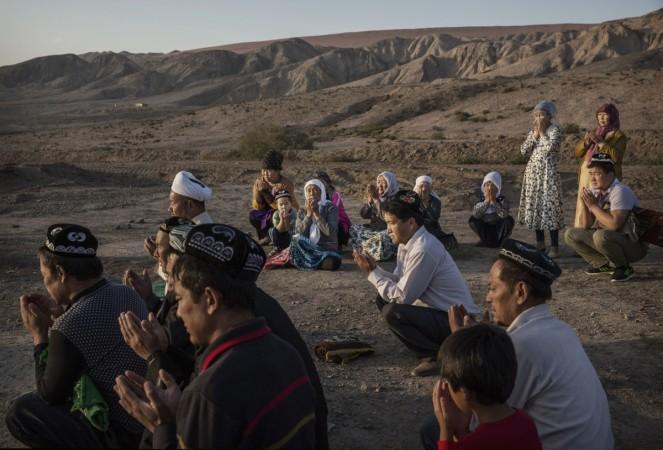
China has once again grabbed the limelight over its questionable relationship with ethnic minority Muslims, who mostly live in the Xinjiang Uyghur Autonomous Region. The members of the group have lashed out at Beijing and are now demanding that the authorities release videos of their relatives who are detained in China's "re-education camps."
The demand comes after China released a footage of imprisoned Uighur musician Abdurehim Heyit, who many thought had died in the camp, reported the Associated Press. While this may have been Beijing way of proving that Heyit was alive and well and also showing that the camps were "humane centres," its decision has clearly backfired, spelling more trouble for the nation.
Now, numerous Uighur Muslims from around the world have taken to social media and are urging the Chinese government to provide information on their family members. The demand has gained massive momentum on social media with the hashtag #MeTooUyghur."
"China, show us their videos if they are alive!" Halmurat Harri, a Finland-based Uighur activist, wrote on Twitter and also said that the government must release the video to prove that the detainees were in good condition and not being abuse or tortured.
"I ask the Chinese regime: Where's my mom and my two brothers? How is their condition? Are they alive or killed? What happened to my family???" wrote another member of the community on Twitter. "I demand that the Chinese government give serious information about it !!!China: publish the video of my family, too!!! #MeTooUyghur"
Why has China released the Heyit video now?
The Chinese internment camps for Uighur Muslims have raised eyebrows for quite sometime now. Several activists have on more than one occasion asked China to stop targeting and detaining ethnic minority Muslims. While China remained tight-lipped on these camps for years, it finally spoke about these camps in October 2018, calling them "humane job-training centers."

Shohrat Zakir, the chairman of Xinjiang's government and an ethnic Uighur himself, said that these camps are for the benefit of the minority group and here they are trained on several skills, which may help them in the future.
However, the issue hit headlines once again after Turkey on Saturday, February 9, slammed China for its concentration camps and ill-treatment of Uighur Muslims. In the statement, the nation's foreign ministry also mentioned Heyit, who is known to have been sentenced to eight years in prison for one of his songs. Heyit was also believed to have died in the second year of his imprisonment.
Beijing then countered Turkey and released a video of Heyit to prove that he was not just alive, but even doing well. Chinese officials then accused Turkey of peddling lies. Chinese foreign ministry spokeswoman Hua Chunying also slammed the #MeTooUyghur movement and the AP quoted her as saying thus: "China has more than 1 billion people, do we need to release a video of everyone?"
Hua went on to call Turkey's statement "a very bad mistake" and said the the Heyit video proved that reports of the musician's death in custody were an "absurd lie."
What does the Heyit video show?
The video released by China reportedly shows Heyit dressed in a gray sweater, standing against a wall. He is heard saying his names, states the date as February 10, 2019, and goes on to say that he is doing well, is in good health, and has never been abused.
However, the authenticity of the video couldn't be verified and details on where the video was recorded and by whom are also not available.
China's re-education camps
While Beijing claims that these are job training centres, former detainees have often narrated spine-chilling details of what goes on in these camps.

In May 2018, two former detainees of these camps spoke of their ordeal to the Washington Post and the conditions at these centres seemed worst than a prison. Omir Bekali and Kayrat Samarkand had revealed that the detainees, mostly Muslims, were forced to disown the religion every hour. They were often forced to criticise their beliefs, religion, and even their loved ones. And if that wasn't enough, the detainees were asked to learn the Communist propaganda and hail and pray for leader Xi Jinping's long life.
"Those who disobeyed the rules, refused to be on duty, engaged in fights or were late for studies were placed in handcuffs and ankle cuffs for up to 12 hours," Samarkand told the daily. He also revealed that punishments included waterboarding and being strapped for long hours in a metal contraption.
Bekali ended up at the "re-education" camp when he was arrested while visiting his parents in Shanshan in the Xinjiang province in March 2017. He was reportedly interrogated for about four days, during which he wasn't allowed to sleep at all, after which he was jailed for seven months. Bekali was then sent to the "re-education" camp for 20 days where he said he was mentally and physically harassed.
When the 42-year-old refused to follow the orders, he was reportedly asked to stand at a wall for five hours on several days. When he still refused to comply, he was sent to solitary confinement and was denied food for about 24 hours.

















